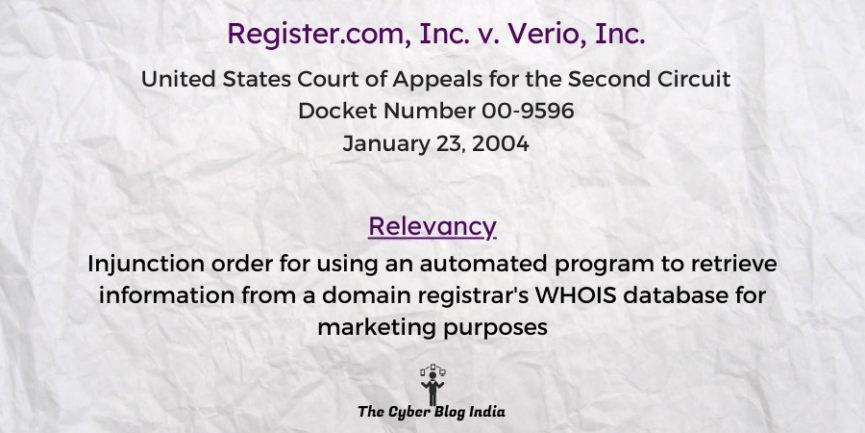Register.com, Inc. v. Verio, Inc.

Register.com, Inc. v. Verio, Inc.
356 F.3d 393
In the United States Court of Appeals for the Second Circuit
Docket Number 00-9596
Before Circuit Judge Leval and District Judge Keenan
Decided on January 23, 2004
Relevancy of the Case: Injunction order for using an automated program to retrieve information from a domain registrar’s WHOIS database for marketing purposes
Statutes and Provisions Involved
- The Computer Fraud and Abuse Act, 18 U.S.C. § 1030
- The Lanham Act, 15 U.S.C. § 1127
Relevant Facts of the Case
- The plaintiff is an ICANN-registered domain registrar for issuing internet domain names. It updated and made contact information available for all registrants in compliance with ICANN and federal agency regulations.
- It added a restricted caption prohibiting searchers from using the WHOIS information to transmit bulk unsolicited commercial advertisements.
- The defendant, Verio, is a website development company. It developed an automated software program for sending consecutive queries daily to get the contact details of new domain registrants. It sent marketing solicitations to these registrants via email, phone, and direct mail.
- As a result, the plaintiff revised their caption to prohibit mass solicitation in every form. Thus, the defendant stopped using this information for email marketing but refused to discontinue marketing via phone and direct mail.
- In a preliminary injunction, the District Court had barred the defendant from using this information. As a result, the defendant has filed an appeal before this court.
Prominent Arguments by the Advocates
The defendant’s counsel:
- Register.com did not have permission to prohibit using WHOIS data for direct mail and phone calls. The ICANN Agreement clearly states that the registration data should remain available for any legitimate purpose except email spam.
- The plaintiff’s Terms of Use were not enforceable because the contract terms did not surface until after the transaction was completed.
- For trespass to chattels, Register had not demonstrated any damage or if the access was illegal. The District Court has erred by not considering public interest before awarding the injunctive relief.
- The District Court’s injunction is anti-competitive and contradicts established DOC and ICANN policies. Verio’s search robot obtained information from Register.com, and there was no formation of a contract between the parties or exchange of remuneration. Further, Verio’s improper use of WHOIS information had no irreversible impact on the plaintiff.
Opinion of the Bench
- In their contract with the plaintiff, ICANN stated that persons should seek to enforce the plaintiff’s promise to ICANN through its grievance policy. Verio must show that it made the agreement for its benefit to enforce this promise. Here, Verio did not do so. The agreement excluded third parties from claiming rights under it in court proceedings.
- The plaintiff’s contractual obligations are only with ICANN. Verio submitted numerous queries daily and knew the terms of use of the plaintiff’s platform.
- Verio kept accessing data from the plaintiff’s computers despite the plaintiff’s implementation of access restrictions.
- The District Court’s findings are within the range of its permissible discretion. The injunction was well within the court’s permitted discretion. The court’s finding for an injunction under the Lanham Act also had an adequate basis.
Final Decision
- The Court of Appeal affirmed the District Court’s ruling, with exceptions.
Anjali Agrawal, an undergraduate student at the NALSAR University of Law, and Linet Christina Thomas, an undergraduate student at Lords Universal College of Law, Mumbai, prepared this case summary during their internship with The Cyber Blog India in May/June 2022.
